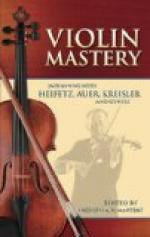“As regards difficulties, technical and other, a distinction might be made between the artist and the average amateur. The latter does not make the violin his life work: it is an incidental. While he may reasonably content himself with playing well, the artist-pupil must achieve perfection. It is the difference between an accomplishment and an art. The amateur plays more or less for the sake of playing—the ‘how’ is secondary; but for the artist the ‘how’ comes first, and for him the shortest piece, a single scale, has difficulties of which the amateur is quite ignorant. And everything is difficult in its perfected sense. What I, as a student, found to be most difficult were double harmonics—I still consider them to be the most difficult thing in the whole range of violin technic. First of all, they call for a large hand, because of the wide stretches. But harmonics were one of the things I had to master before Professor Auer would allow me to appear in public. Some find tenths and octaves their stumbling block, but I cannot say that they ever gave me much trouble. After all, the main thing with any difficulty is to surmount it, and just how is really a secondary matter. I know Professor Auer used to say: ’Play with your feet if you must, but make the violin sound!’ With tenths, octaves, sixths, with any technical frills, the main thing is to bring them out clearly and convincingly. And, rightly or wrongly, one must remember that when something does not sound out convincingly on the violin, it is not the fault of the weather, or the strings or rosin or anything else—it is always the artist’s own fault!
HOW TO STUDY
“Scale study—all Auer pupils had to practice scales every day, scales in all the intervals—is a most important thing. And following his idea of stimulating the pupil’s self-development, the Professor encouraged us to find what we needed ourselves. I remember that once—we were standing in a corridor of the Conservatory—when I asked him, ’What should I practice in the way of studies?’ he answered: ’Take the difficult passages from the great concertos. You cannot improve on them, for they are as good, if not better, as any studies written.’ As regards technical work we were also encouraged to think out our own exercises. And this I still do. When I feel that my thirds and sixths need attention I practice scales and original figurations in these intervals. But genuine, resultful practice is something that should never be counted by ‘hours.’ Sometimes I do not touch my violin all day long; and one hour with head work is worth any number of days without it. At the most I never practice more than three hours a day. And when my thoughts are fixed on other things it would be time lost to try to practice seriously. Without technical control a violinist could not be a great artist; for he could not express himself. Yet a great artist can give even a technical study, say a Rode etude,




